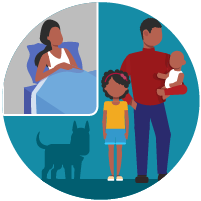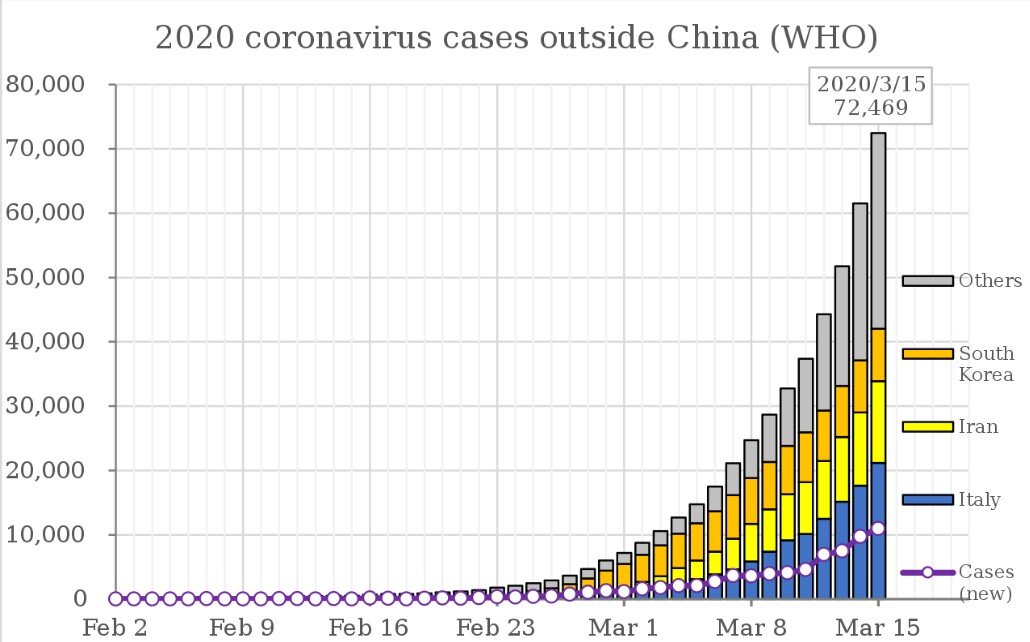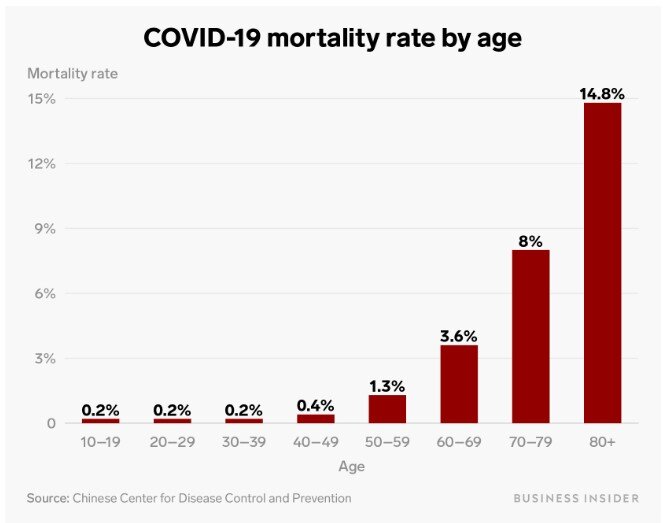The novel coronavirus COVID-19 is sweeping across the world and the official numbers here in the US are grossly misleading. A medically reasonable assumption is that >1% of the US population is already infected and the vast majority of those people haven’t yet begun to exhibit symptoms[1]. If there are 50 official cases in your area then there are probably roughly 50,000 people in your vicinity with the virus right now and it’s communicable for days before symptoms appear.
Our officials have failed to act and now it’s too late to prevent it from sweeping through our country, but we can learn from the very effective steps that were taken in Taiwan and China and save many predominantly older lives by simply acting intelligently and responsibly right now.
#1 – Limit your movements and work at home if at all possible. The widespread adoption of social distancing dramatically reduces the contagion rate from over 2 (resulting in the exponential infection rate that we’re seeing right now), to a rate of under 1 – which reverses the spread and turns the rising number of cases into a dropping number of cases.
#2 – Sanitize your hands frequently and don’t touch your mouth or nose or eyes (a mask and goggles are very useful for this). This thing can survive on plastic and metal surfaces for 3-9 days[1,3] and can remain contagious in microscopic droplets in the air for 3 hours[2] so try not to touch door handles and other publicly used surfaces. If you must do so wear disposable surgical gloves or a paper towel to protect your hands, or at least sanitize your hands promptly after doing so.
There are some excellent information resources available that can answer most of our questions, so I’m posting them below and will update these links as I find superior information.
Be safe, be smart, and don’t panic – the vast majority of us can get through this infection without developing any severe symptoms, but the better we do at responding intelligently to this then the more lives we will save, so let’s all do that.
Here’s a good overview of the pandemic and the powerful effect of the measures that we can all take right now:
"Coronavirus: Why You Must Act Now," Tomas Pueyo, Medium, Updated March 13, 2020
Here’s how to make disinfectants that are effective against the COVID-19 virus using commonly available household chemicals:
“disinfectants with 62-71% ethanol (rubbing alcohol), 0.5% hydrogen peroxide or 0.1% sodium hypochlorite (chlorine bleach solution at 1/3 cup per gallon of water) can ‘efficiently’ inactivate coronaviruses within a minute, according to the study.”
How long can the new coronavirus last on surfaces? | Live Science
I'm keeping a solution of 1/2 cup of bleach per 1 gallon of water in three sprayers:
- a mini sprayer with a cap that I keep in my pocket so I can sterilize my hands or anything else that I want to disinfect wherever I go
- a medium sprayer plus a roll of paper towels and a box of disposable latex surgical gloves in the car so I can disinfect my hands and steeling wheel and door handles whenever I want, and
- a large sprayer and a box of disposable latex surgical gloves at home for home use
[1] "Ohio health official estimates 100,000 people in state have coronavirus," Peter Sullivan, The Hill, March 12, 2020
"We know now, just the fact of community spread, says that at least 1 percent, at the very least, 1 percent of our population is carrying this virus in Ohio today," Acton said.
Ohio health official estimates 100,000 people in state have coronavirus
[2] "Tests indicate coronavirus can survive in the air" (for three hours), John Bowden, The Hill, March 11, 2019
Tests indicate coronavirus can survive in the air
[3] "Persistence of coronaviruses on inanimate surfaces and their inactivation with biocidal agents," Journal of Hospital Infection, March 2020
"The analysis of 22 studies reveals that human coronaviruses such as Severe Acute Respiratory Syndrome (SARS) coronavirus, Middle East Respiratory Syndrome (MERS) coronavirus or endemic human coronaviruses (HCoV) can persist on inanimate surfaces like metal, glass or plastic for up to 9 days"
Persistence of coronaviruses on inanimate surfaces and their inactivation with biocidal agents - ScienceDirect
Our officials have failed to act and now it’s too late to prevent it from sweeping through our country, but we can learn from the very effective steps that were taken in Taiwan and China and save many predominantly older lives by simply acting intelligently and responsibly right now.
#1 – Limit your movements and work at home if at all possible. The widespread adoption of social distancing dramatically reduces the contagion rate from over 2 (resulting in the exponential infection rate that we’re seeing right now), to a rate of under 1 – which reverses the spread and turns the rising number of cases into a dropping number of cases.
#2 – Sanitize your hands frequently and don’t touch your mouth or nose or eyes (a mask and goggles are very useful for this). This thing can survive on plastic and metal surfaces for 3-9 days[1,3] and can remain contagious in microscopic droplets in the air for 3 hours[2] so try not to touch door handles and other publicly used surfaces. If you must do so wear disposable surgical gloves or a paper towel to protect your hands, or at least sanitize your hands promptly after doing so.
There are some excellent information resources available that can answer most of our questions, so I’m posting them below and will update these links as I find superior information.
Be safe, be smart, and don’t panic – the vast majority of us can get through this infection without developing any severe symptoms, but the better we do at responding intelligently to this then the more lives we will save, so let’s all do that.
Here’s a good overview of the pandemic and the powerful effect of the measures that we can all take right now:
"Coronavirus: Why You Must Act Now," Tomas Pueyo, Medium, Updated March 13, 2020
Here’s how to make disinfectants that are effective against the COVID-19 virus using commonly available household chemicals:
“disinfectants with 62-71% ethanol (rubbing alcohol), 0.5% hydrogen peroxide or 0.1% sodium hypochlorite (chlorine bleach solution at 1/3 cup per gallon of water) can ‘efficiently’ inactivate coronaviruses within a minute, according to the study.”
How long can the new coronavirus last on surfaces? | Live Science
I'm keeping a solution of 1/2 cup of bleach per 1 gallon of water in three sprayers:
- a mini sprayer with a cap that I keep in my pocket so I can sterilize my hands or anything else that I want to disinfect wherever I go
- a medium sprayer plus a roll of paper towels and a box of disposable latex surgical gloves in the car so I can disinfect my hands and steeling wheel and door handles whenever I want, and
- a large sprayer and a box of disposable latex surgical gloves at home for home use
[1] "Ohio health official estimates 100,000 people in state have coronavirus," Peter Sullivan, The Hill, March 12, 2020
"We know now, just the fact of community spread, says that at least 1 percent, at the very least, 1 percent of our population is carrying this virus in Ohio today," Acton said.
Ohio health official estimates 100,000 people in state have coronavirus
[2] "Tests indicate coronavirus can survive in the air" (for three hours), John Bowden, The Hill, March 11, 2019
Tests indicate coronavirus can survive in the air
[3] "Persistence of coronaviruses on inanimate surfaces and their inactivation with biocidal agents," Journal of Hospital Infection, March 2020
"The analysis of 22 studies reveals that human coronaviruses such as Severe Acute Respiratory Syndrome (SARS) coronavirus, Middle East Respiratory Syndrome (MERS) coronavirus or endemic human coronaviruses (HCoV) can persist on inanimate surfaces like metal, glass or plastic for up to 9 days"
Persistence of coronaviruses on inanimate surfaces and their inactivation with biocidal agents - ScienceDirect




